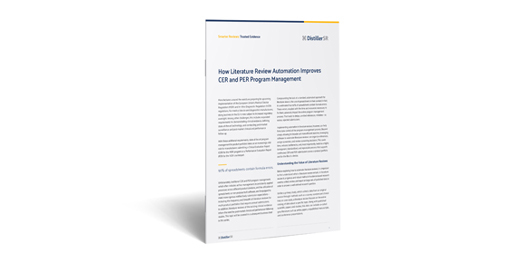Case Study
DistillerSR Enables Sixfold Increase in Literature Review Completion
DistillerSR™ enabled faster, more efficient literature reviews, while improving collaboration amongst a distributed global workforce of medical writers.

Faster, More Efficient Screening
Before DistillerSR, the clinical evaluations team completed 15 literature reviews every year. Since implementing the platform, with a modest increase in headcount, they have completed 100 reviews annually.

Consistent, Audit-Ready CER Submissions

Cost Savings and Decreased Chance for Errors
This leading global eye care device manufacturer uses literature reviews throughout their devices’ development cycle: for example, they collect and analyze literature to fulfill clinical safety and performance data required for post-market surveillance. The clinical evaluation team also conducts literature reviews for establishing state-of-the-art (SOTA) and to support new indications for an existing medical device, critical facets to writing CERs.
MDR establishes rigorous device standards on quality and safety measures across all EU member countries. Device manufacturers are now expected to provide more rigorous clinical evidence/ clinical evaluation data to support their regulatory submissions to notified bodies.
The continuous submission requirements of EU MDR and the ever-growing volume of published scientific literature have forced all medical device companies to evaluate how they collect, manage and analyze scientific literature.
Prior to implementing DistillerSR at the company, each literature review was a multi-step, time consuming and laborious process. First, the team would retrieve the full text articles from databases, such as PubMed, and print them out. Then, they would read through their stack of papers and manually highlight important portions, take notes on the margin of each sheet of paper, and use post-it tabs to mark relevant articles
After that, the team would write up the exclusion codes list, and separate all the references into piles according to the list. Once this process was completed, they would build excel spreadsheets for the included articles and the excluded articles. From there, they would perform the analysis and appraisal process, include the results in a report, and send those out for review.
At this point, invariably, someone would question the reasoning for an included or an excluded article. That would force the reviewers back to the drawing board and they would find themselves moving things around in spreadsheets, from one table to another table. This would significantly increase the risk for human error and the chance for inaccurate results by the end of the literature review.
The clinical evaluations team was unaware of DistillerSR until one service provider introduced them to the platform. “The first time I saw DistillerSR in action, I was convinced that it would enable us to do our work more efficiently, ‘’ says one company team member.
The company’s medical writers were immediately impressed by the platform’s user-friendly interface. Searching and importing references have become much easier with DistillerSR’s online integration with PubMed, OVID, and EBSCO. In addition, teams can quickly and cost effectively access full-text versions of their references.
DistillerSR’s configurable workflow, meanwhile, simplifies the process of handling large volumes of information and centrally tracks inclusions and exclusion of all references. As a result, DistillerSR has enabled the company’s medical writers to review references by as much as 6 times faster than manual methods. As well, the company’s literature review process has been completely paperless since 2017 – thanks to DistillerSR.
As a web-based platform, DistillerSR allows for seamless collaboration between team members in different timezones. For instance, one team member can finish their workday in the United States and another team member in India can pick up exactly where the first one left off.
Having a single source of evidence means any conflicts or red flags can be efficiently managed and projects can be completed faster. Project managers can monitor progress in real-time and centrally track all account activity through a complete and transparent audit-trail.
Before DistillerSR, the team of reviewers would complete approximately 15 literature reviews over the course of 12 months. Since fully implementing the platform and with a modest increase in headcount, the number of literature reviews that they complete has increased to 100 for the same 12-month period.
Leveraging DistillerSR’s automation and smarter workflows throughout the literature review lifecycle translated into significant time and cost savings for the company. Further, DistillerSR dramatically reduced the chance for human error because there is no longer the need to build tables and inclusion/exclusion lists manually. In short, a faster and more accurate way to conduct literature reviews with DistillerSR.
Download the PDF version of this case study
Related Resources

PMS Webinar Recap:
Johnson & Johnson and Philips on their journey to streamline post-market surveillance literature reviews for EU MDR/IVDR submissions.

Philips
Philips achieves faster, more accurate literature reviews for CER submissions with DistillerSR.

How Literature Review Automation Improves CER and PER Program Management
Automated literature reviews provide greater levels of auditability and program management to CER and PER submissions
Learn More About DistillerSR




